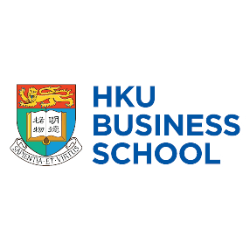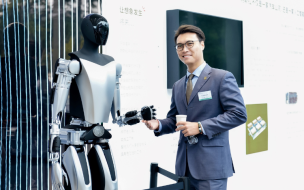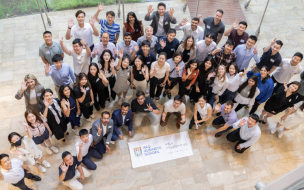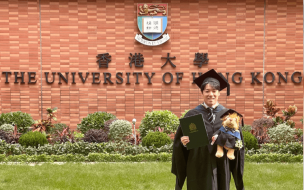Embarking on an MBA program is also perfect if you’re looking to shift industries, move into a management role, or gain skills in areas such as strategy, finance, and entrepreneurship.
Find out how three current students on the University of Hong Kong Business School (HKU Business School) are using their MBA to accelerate their ambitions.
When is the best time to study for an MBA?
When he decided to pursue his MBA at HKU Business School, Dave Lee already had seven years’ experience in finance, including managing $1 billion in global private real estate funds at KB Investments in South Korea, but felt he had “lost momentum” and wanted to progress in his professional life. “I didn’t want to stay in the same industry, pursuing the same roles and responsibilities,” says Dave, from South Korea.

He chose to enroll into the MBA at HKU Business School, ranked among the top 30 programs in Asia by the Financial Times, because, Dave says: “As Asia’s global financial powerhouse, Hong Kong has tremendous opportunities and the school offers the chance to help me make a meaningful transition to a global investment role, focussing on private equity and debt in the Asia region.
Dave also thinks that his MBA is giving him an opportunity to “work out what my values are and to open myself to new possibilities”.
Yancy Tran came to her MBA with 15 years’ experience in communications and marketing—latterly leading business strategy for Dentsu in Vietnam. She enrolled into the program with a desire to improve her understanding of finance and practical market analysis, and “to develop a strategic mindset across a variety of business functions”.
Curiosity was a driver for Cheryl Chen, who came to the program with eight years’ work experience. “I’ve always been keen to learn about business and the MBA not only lets me draw on my previous work experience but to also develop a more practical perspective on the real business world.” Before embarking on her studies Cheryl worked in the digital venture department at Starbucks China and as a consultant at McKinsey in its Shanghai office.
What skills do you learn on an MBA?
Yancy feels that her HKU MBA is helping her build on skills she developed with her earlier studies by deepening her understanding of broader business principles. “I am learning about things like P&L [profit and loss], how I should look at a company, evaluate its worth, to know if a stock is good or not, and how to balance a portfolio," she says.
Yancy finds the practical nature of the MBA curriculum particularly useful. “We can take a real case study and look at what happened in the market and then deep dive into the situation and what we would have done differently.”

Cheryl says she has enjoyed “learning about consumer business from doing, looking at different roles and functions" from her past experiences. By embarking on interdisciplinary subjects such as corporate finance, marketing strategy, and analytics for managers etc., she has built a more systematic and consolidated understanding of business as well as developing “bigger aspirations to empower startups, to explore opportunities outside of China, and to build a worldwide network of contacts," she says.
Dave also likes the curriculum at HKU—whose MBA students have between two and 16 years of professional experience—because he can select the courses that are most useful to him. “I did my undergrad in finance so didn’t want to have to replicate what I already knew, but courses related to big data and AI helped me gain new skills.”
Both Yancy and Dave enjoy meeting and working alongside their fellow students, many of whom are from an international background. “I’m quite introverted, but the MBA program has helped me improve networking skills through various events,” says Dave. “I’ve met people here from China and Japan, similar to mine, but I’ve come to realize there are many differences in our perspectives and ways of interacting. With such a diverse class profile, including peers from India, Russia, and Ukraine, I’ve gained valuable insights and broadened my understanding cultural dynamics.
How can a coach help your career?
HKU also provides students with a variety of career coaching opportunities. “We have internal and external coaches, and also mentors,” says Dave. These coaches provide guidance and recommendations to students—and can even facilitate professional opportunities: “I got a part-time role, helping a company raise funds at a boutique asset management company, through a referral from my external coach.”
The role gives Dave the chance to directly translate the skills he is learning on his MBA into a real-world situation. Dave hopes that the MBA will help him “go beyond just investing into real estate. I want to move into diverse investment roles". After completing his studies he hopes to find a role at a global investment firm in Hong Kong or Singapore, focusing on private fund investments in the Asia region.
What skill sets will you develop on an MBA?
Yancy has also found the 1:1 mentoring included in the HKU program useful. “We are paired with an industry expert to help navigate the local market as well as connecting us to other experts for career development and progression,” she says.

Another course highlight are ‘fireside chats’ with industry experts, for example the CEO of APAC Hermes, which provide insights into global economies and career consultation.
Yancy highlights the usefulness of executive leadership training with practical skill sets like networking, resumé building, presentation, and personal branding.
“I believe my MBA will really enhance my career prospects,” concludes Yancy, who hopes when she graduates to explore foreign markets outside Vietnam. "I want to apply my expertise and experience—as well as the business-driven mindset I am honing on my MBA—in the field of consumer experience.”








